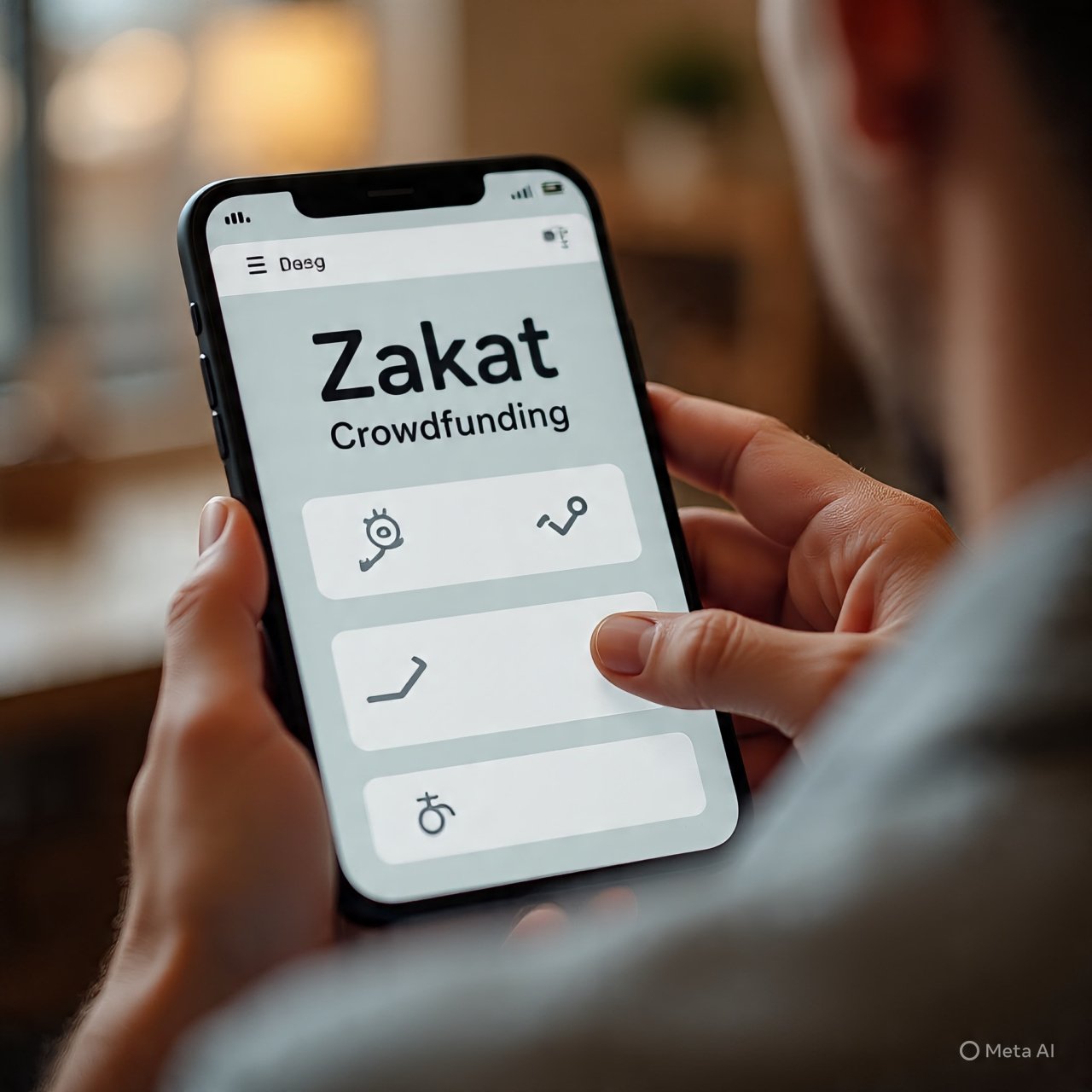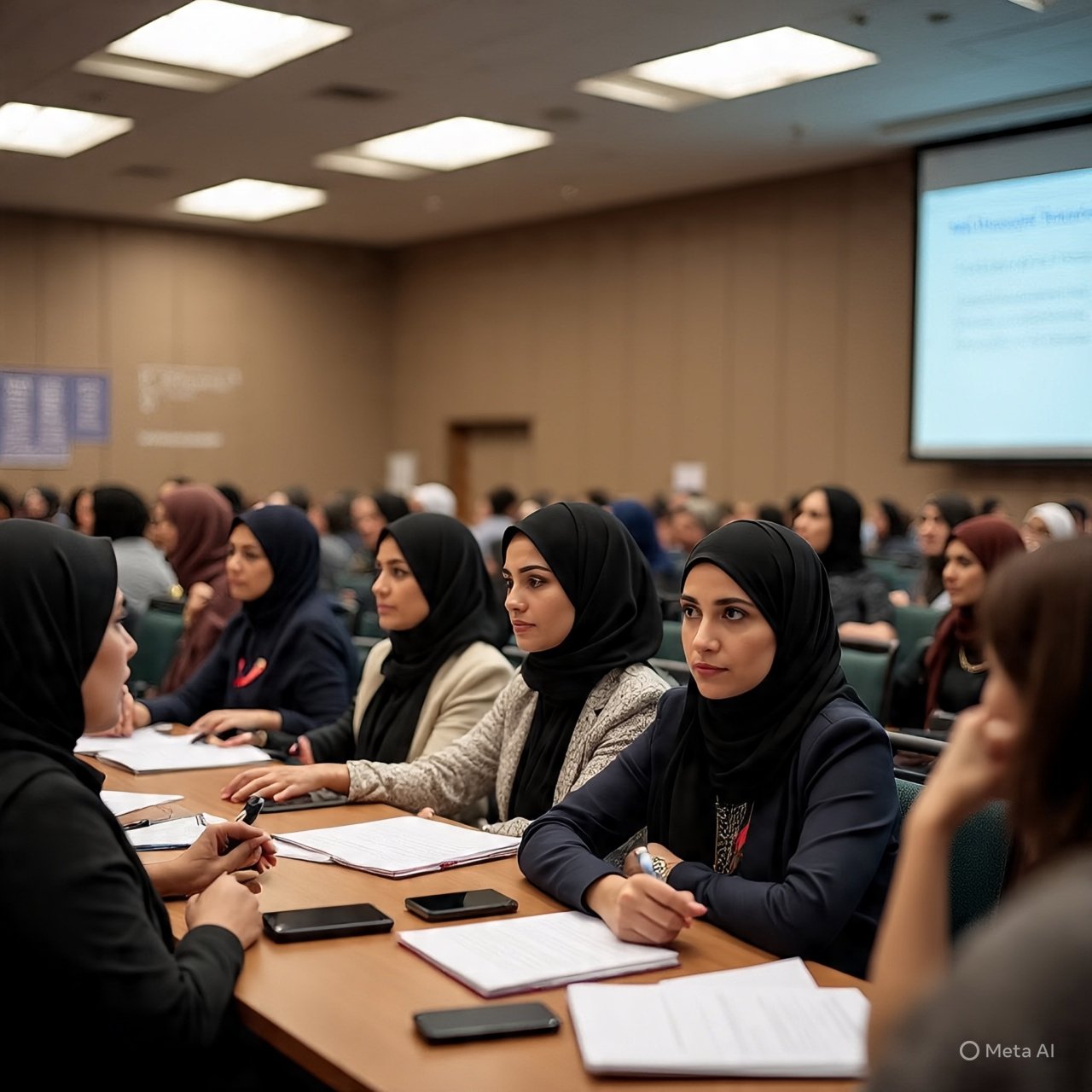Zakat Crowdfunding Apps: Digital Revolution in Islamic Finance
Introduction
The digital revolution has transformed every sector of Islamic finance, especially the field of Zakat management and administration. Today, Zakat crowdfunding applications have not only revolutionized the methods of Zakat payment but have also ensured complete transparency in donations. This article will cover the jurisprudential aspects, Sharia status, and technological integration of these modern digital platforms. We will see how blockchain technology, artificial intelligence, and data analytics are giving modern shape to the ancient duty of Zakat. At the same time, we will also analyze the challenges facing this new system and present their potential solutions. This research will not only cover the current situation but will also shed light on potential future scenarios and development possibilities.
New Era of Digital Zakat: Emergence of Crowdfunding Apps
Crowdfunding apps have completely transformed the concept of Zakat. These apps not only speed up the processes of Zakat collection and distribution but also make access to deserving recipients possible at global level. In these applications, every transaction is recorded securely with the help of blockchain, which has led to extraordinary increase in transparency. From a jurisprudential perspective, the important question is whether paying Zakat through such apps is correct from Sharia viewpoint? The answer is affirmative, provided the apps are designed according to Sharia principles. In these apps, through “smart contracts,” it is ensured that Zakat funds reach only the deserving recipients, and no kind of change or obstacle occurs in them.
This modern system has strengthened the collective aspect of Zakat, through which the Islamic concept of mutual cooperation and financial justice among the Muslim Ummah has become stronger. The special feature of these apps is that they not only make Zakat payment easier but also make it secure and transparent. Every donor can track every stage of their Zakat amount, to the extent that they can see which person their Zakat reached and how it was used. This transparency not only increases donors’ trust but also guarantees the protection of recipients’ rights.
These apps have adapted the concept of Zakat according to the requirements of modern era. Now any Muslim sitting in any corner of the world can deliver their Zakat to deserving recipients. This is not only a means of saving time but also guarantees better utilization of resources. Through these apps, by using Zakat funds collectively, large projects can be started, such as Islamic schools, hospitals, and other welfare projects. Thus, the concept of Zakat transforms from merely individual worship to a means of collective welfare.
Sharia Standard of Transparency: In Light of Islamic Commands
Transparency is a fundamental requirement of Zakat, and its practical example is found in crowdfunding apps. In the Holy Quran, Allah says: “And in their wealth, there was a right for the beggar and the deprived” (Adh-Dhariyat: 19). This verse clarifies the eligibility for Zakat, and transparency is part of it. In modern apps, every donor can see where and how their Zakat was spent, to the extent that photos and documents of the amount reaching the recipient are also available. In jurisprudential terminology, this fulfills the requirement of “trustworthiness,” in which it is necessary to prove being trustworthy.
To understand the Sharia standard of transparency, we have to study the shining pages of Islamic history. During the era of Hazrat Umar Farooq (RA), there was complete transparency in the Zakat system. Today’s digital apps are actually giving modern shape to this golden tradition. The blockchain technology used in these apps makes every transaction immutable, meaning no kind of change is possible in it. This gives modern shape to the concept of “testimony” in jurisprudential terminology.
An important aspect of transparency is also that the donor has full right to obtain complete information about their Zakat. This is exactly according to the principle of “Al-Haq ya’rifu bi-adillatih” in Islamic law. These apps have the facility that the donor can see every stage of their Zakat in real time. This not only increases their trust but also increases their interest in fulfilling the duty of Zakat.
Blockchain Technology: Immutable Record of Zakat
Blockchain technology is the heart and soul of Zakat crowdfunding apps. It is a digital transaction system in which every transaction is recorded and cannot be changed. From a jurisprudential perspective, this gives modern shape to the Islamic concept of “testimony.” Just as there are witnesses for transactions in Islamic law, similarly there are “witnesses” for every transaction in blockchain. Through this technology, every stage of Zakat amount is recorded, from donor to recipient, which eliminates the possibility of any kind of fraud or misappropriation.
The technical structure of blockchain is extremely complex yet secure. Multiple transactions are recorded in each block, and every new block is cryptographically linked to the previous block. This chain is established in such a way that if someone wants to change one block, they would have to change all blocks of the entire chain, which is practically impossible. This is why blockchain is called “immutable ledger.” This characteristic is extremely important in the matter of Zakat because it ensures the protection of Zakat funds.
From a jurisprudential perspective, blockchain technology fulfills several Islamic principles. Firstly, it protects the principle of “trustworthiness.” Secondly, it strengthens the concept of “justice.” Thirdly, it gives modern shape to the system of “testimony.” Fourthly, it ensures “transparency.” Fifthly, it creates a sense of “responsibility.” From all these aspects, this technology is proving to be a blessing for the Islamic financial system.
Role of Artificial Intelligence: Smart Assessment of Deserving Recipients
Artificial Intelligence (AI) has revolutionized the process of assessing deserving recipients for Zakat. Through AI algorithms, apps can automatically identify those individuals who are truly deserving of Zakat. This system analyzes data while considering Islamic standards of “poverty” and “need.” For example, AI reviews a person’s financial status, debts, and other economic factors to form their “Zakat eligibility score.”
The working methodology of AI system is extremely complex. It recognizes data patterns through machine learning algorithms. For example, if people in a certain area are suffering from specific types of economic difficulties, AI can identify this pattern and include them in the list of deserving recipients. This system is much more efficient and accurate than traditional methods. The possibilities of human error in it are almost non-existent.
From a Sharia perspective, the use of AI has several benefits. Firstly, it strengthens the Islamic principle of “justice.” Secondly, it fulfills the requirements of “trustworthiness.” Thirdly, it ensures “transparency.” Fourthly, it gives practical shape to the concept of “excellence.” Fifthly, it promotes “equality.” From all these aspects, the use of AI is further improving the Zakat system.
Global Level Impacts: International Zakat Network
Crowdfunding apps have made Zakat a global duty. Now any Muslim sitting in any corner of the world can deliver their Zakat to deserving recipients. This gives a new practical shape to the Islamic concept of “Ummah.” Through these apps, Zakat can be delivered directly to poor Muslims in Palestine, Kashmir, Syria, and Africa, without any intermediary institution.
The technical aspects of this global network are very impressive. These apps operate globally through cloud computing. These apps adapt themselves while considering local regulations of each country. For example, if there is a ban on cryptocurrency in a country, the app automatically switches to traditional banking channels. This flexibility is the key to the success of these apps.
Its Sharia benefits are numerous. Firstly, it strengthens the concept of “Tawheed.” Secondly, it gives practical shape to the Islamic concept of “brotherhood.” Thirdly, it promotes the Islamic principle of “cooperation.” Fourthly, it spreads the concept of “justice” at global level. Fifthly, it implements the Islamic concept of “mercy.” From all these aspects, this global network is proving to be an excellent gift for the Muslim Ummah.
Sharia Supervision: Establishment of Digital Sharia Boards
There is a need for permanent Sharia supervision for these modern apps. For this purpose, “Digital Sharia Boards” are being established, which conduct Sharia audit of every function of the apps. These boards ensure that all stages of Zakat collection, distribution, and management in the apps are according to Sharia.
The composition of these Digital Sharia Boards is extremely comprehensive. They include contemporary jurists along with technology experts. These boards conduct complete audit of apps at regular intervals. This audit reviews technical aspects along with Sharia aspects. If any deficiency is found, it is immediately removed.
These modern methods of Sharia supervision are actually the modern form of the historical Islamic institution of “Hisbah.” In Islamic history, the job of the Hisbah institution was to supervise the implementation of Sharia commands in different sectors of society. In today’s digital era, Digital Sharia Boards are performing the same job. These institutions are supervising not only Zakat but also other Islamic financial services.
Data Analytics: Review of Collective Benefits of Zakat
Modern apps review the collective benefits of Zakat through data analytics. This system tells how many families’ financial condition improved through Zakat funds, how many youth got employment, and how many children’s education became possible. This gives practical shape to the Islamic principle of “Maslahah” (collective welfare).
The technical process of data analytics involves different steps. Firstly, there is the stage of data collection. Secondly, data processing occurs. Thirdly, data analysis happens. Fourthly, interpretation of results occurs. Fifthly, reporting happens. All these stages are automated and complete without human intervention.
From a Sharia perspective, the use of data analytics has several benefits. Firstly, it strengthens the concept of “excellence.” Secondly, it promotes the principle of “justice.” Thirdly, it ensures “transparency.” Fourthly, it creates a sense of “responsibility.” Fifthly, it improves the system of “accountability.” From all these aspects, the use of data analytics is making the Zakat system more effective.
Privacy and Trust: Rights of Deserving Recipients in Digital Era
Special care is taken for the privacy protection of deserving recipients in these apps. Their personal information is kept secure through blockchain encryption. This is exactly according to the Islamic principle of “Hifz al-Irz” (protection of honor), according to which it is forbidden to harm the honor of any Muslim.
The technical mechanisms for privacy protection are extremely advanced. These include technologies like end-to-end encryption, data anonymization, and access controls. These mechanisms ensure that only authorized individuals can access sensitive data. This protects the honor and dignity of deserving recipients.
From a Sharia perspective, privacy protection has several aspects. Firstly, it observes the Islamic principle of “covering.” Secondly, it fulfills the requirements of “trustworthiness.” Thirdly, it strengthens the concept of “justice.” Fourthly, it reflects the principle of “excellence.” Fifthly, it is exactly according to the Islamic concept of “humility.” From all these aspects, privacy protection is an important part of the Zakat system.
Alternative Financial System: Connection with Islamic Banking
These apps are directly connected with the Islamic banking system. Through this, Zakat funds can also be used as “Qard Hasan” (benevolent loan) in Islamic banks. This creates integration with Islamic financial instruments like “Tawarruq” and “Murabaha.”
The technical aspects of this integration are extremely complex. These apps connect with Islamic banks’ systems through APIs. This integration happens in real time, which makes transactions process immediately. Advanced encryption protocols are used for the security of this system.
In terms of Sharia benefits, this integration is extremely important. Firstly, it strengthens the Islamic principle of “cooperation.” Secondly, it promotes the concept of “justice.” Thirdly, it fulfills the requirements of “trustworthiness.” Fourthly, it ensures “transparency.” Fifthly, it is exactly according to the Islamic concept of “blessing.” From all these aspects, this integration is making the Islamic financial system stronger.
New Generation Trend: Digital Zakat and Youth Participation
Young Muslims are taking more interest in paying Zakat through these apps. These apps make Zakat payment “user-friendly” for them. They include elements of “gamification,” such as “badges” and “achievements” for donations.
Modern features have been included in these apps to attract the new generation. These include features like social sharing, progress tracking, and achievement badges. These features motivate youth towards Zakat payment. Besides this, these apps also provide educational content, which makes youth realize the importance of Zakat.
From a Sharia perspective, this trend is extremely positive. Firstly, it fulfills the Islamic duty of “invitation.” Secondly, it promotes the principle of “education.” Thirdly, it is exactly according to the Islamic concept of “encouragement.” Fourthly, it observes the principle of “ease.” Fifthly, it reflects the Islamic concept of “wisdom.” From all these aspects, this trend is best for the future of the Muslim Ummah.
Challenges and Risks: Sharia Deficiencies in Digital System
These apps also have some Sharia challenges. For example, some apps charge “processing fees,” which are taken from Zakat funds. From a jurisprudential perspective, this can create problems, because taking administrative expenses from Zakat funds is not permissible according to some jurists.
These challenges also have technical aspects. For example, problems like system failures, security breaches, and technical glitches may be faced. Continuous monitoring and upgrading are needed to solve these problems. Besides this, user education is also extremely important.
From a Sharia perspective, solutions exist for these challenges. Firstly, Sharia supervision committees can be established. Secondly, technical standards can be formulated. Thirdly, user awareness programs can be run. Fourthly, regular audits can be conducted. Fifthly, continuous improvement processes can be adopted. Through all these measures, these challenges can be controlled.
Collective Zakat: Ummah’s Joint Projects
These apps make collective Zakat projects possible. For example, Zakat funds of the entire Ummah can be collected and used in large construction works, such as building Islamic hospitals, schools, and water projects.
The technical aspects of these projects are extremely comprehensive. These include project management tools, financial tracking systems, and progress monitoring mechanisms. These systems ensure that every project completes on time and within budget. Besides this, these systems also provide transparency.
In terms of Sharia benefits, these projects are extremely important. Firstly, they strengthen the Islamic principle of “cooperation.” Secondly, they promote the concept of “justice.” Thirdly, they fulfill the requirements of “trustworthiness.” Fourthly, they ensure “transparency.” Fifthly, they are exactly according to the Islamic concept of “blessing.” From all these aspects, these projects are a means of development for the Muslim Ummah.
Future Scenarios: Concept of Zakat in Metaverse
In the near future, a system of Zakat payment through metaverse may be introduced. In this, users will be able to pay Zakat through their avatars, and observe its effects in virtual reality.
The technical aspects of metaverse technology are extremely advanced. These include technologies like virtual reality, augmented reality, and mixed reality. These technologies provide users with immersive experience. In the matter of Zakat, this experience can prove to be extremely educational and motivational.
From a Sharia perspective, the use of metaverse has several aspects. Firstly, it can be a modern form of the duty of “invitation.” Secondly, it can promote the principle of “education.” Thirdly, it can strengthen the concept of “encouragement.” Fourthly, it can observe the principle of “ease.” Fifthly, it can reflect the Islamic concept of “wisdom.” From all these aspects, the use of metaverse can further improve the Zakat system.
Continuous Development: Evolutionary Journey of Zakat Apps
These apps are continuously going through stages of development. New features are being added every day, such as “Zakat calculator” which calculates Zakat amount in real time, and “Zakat portfolio” which keeps record of all users’ donations.
The technical aspects of this development are extremely dynamic. These include agile development methodologies, continuous integration/continuous deployment (CI/CD) pipelines, and user feedback mechanisms. These mechanisms ensure that apps keep improving continuously.
From a Sharia perspective, this evolution is extremely positive. Firstly, it is exactly according to the Islamic principle of “Ijtihad.” Secondly, it strengthens the concept of “renewal.” Thirdly, it fulfills the duty of “reform.” Fourthly, it observes the principle of “wisdom.” Fifthly, it is according to the concept of “Maslahah.” From all these aspects, this evolution is best for the future of the Zakat system.
Conclusion: Dream of Balanced Digital Zakat
Finally, it can be said that Zakat crowdfunding apps are an important part of the future of Islamic finance. They not only make the duty of Zakat easier but also strengthen the Islamic principles of transparency, justice, and collective welfare in it. However, their Sharia challenges cannot be ignored. There is a need for scholars and technologists to work together to develop a system that not only meets modern requirements but also reflects all commands of Sharia.
In this regard, a few suggestions are presented. Firstly, permanent Sharia supervision committees should be established. Secondly, technical standards should be formulated. Thirdly, user education programs should be run. Fourthly, regular audits should be conducted. Fifthly, continuous improvement processes should be adopted. Through all these measures, we can establish a balanced digital Zakat system that not only fulfills Sharia requirements but is also according to the requirements of modern era. This is the key to proper implementation of Zakat in our digital era.


